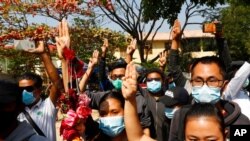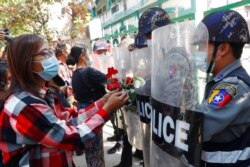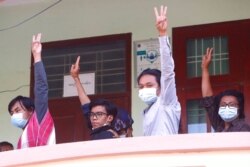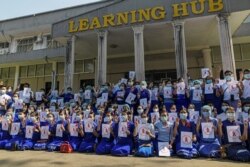Early Monday, Myanmar’s de facto leader, Aung San Suu Kyi, many of her cabinet members, student leaders, monks, bloggers, writers and dissidents were detained by the country’s military leaders following allegations of fraud in the November election, won by the ruling National League for Democracy (NLD) — a result the military does not accept.
A number of expatriates and locals living in Yangon have spoken to VOA about their reaction to the coup. Some have used pseudonyms for fear of retaliation by the government.
“It still hasn’t sunk in what has happened. I feel I can say that I know the people here. I have a lot of Burmese friends and I’m heartbroken for them,” said one expat who wished to remain anonymous out of concern for her safety.
She said all her local friends support Suu Kyi’s NLD, and that she had witnessed people campaigning tirelessly to ensure the party’s victory last year.
“A lot of my students are all taking part in the civil disobedience movement,” she said, referring to a pro-democracy campaign involving socially distanced demonstrations, strikes and boycotts in response to the coup.
“I’ve got students that are doctors, nurses and engineers,” she said. “You know, we are hearing the pots and pans at night; everyone feels shattered from it. They are all broken."
New tactics
Dissidents and activists started the disobedience movement as a way for citizens to voice their rejection of the military takeover.
Spurred on by medical workers striking to protest the coup and urging NLD supporters to do the same, the campaign is a new form of political activism for the country. Instead of protesting in large crowds on the street — a response to previous coups that almost always ended in bloodshed — people are abiding by COVID-19 safety measures by staying at home, campaigning on social media and banging pots and pans in their own neighborhoods.
Laura Maiah, a medical doctor working in one of Yangon’s general hospitals who studies English part time, told VOA, "As a citizen of Myanmar, we want peace, justice, democracy and an NLD leader who can develop our country in the same way that other countries have.”
In recent times, the NLD has gained widespread support not only from the medical community in Myanmar but also from broader swaths of society during the COVID-19 pandemic, which the NLD has been praised for battling.
The NLD has improved international relations, the economy and the education sector, which have all had positive effects on the country and are the main reasons for its landslide victory in the last election. However, it has been criticized internationally for the government’s failure to deal with the military’s human rights abuses against the Rohingya minority in Rakhine state.
Communications, media blackouts
Resistance to the coup is growing despite the military government's decision to block access to Facebook, which is how most people access the internet in Myanmar.
The Ministry of Communications and Information said in a statement that the social media giant would be blocked until Sunday in order to keep “stability” in the country.
Unlike media and communications blackouts during prior coups, citizens with adequate financial means have rushed to purchase VPNs (virtual private networks) in recent days to circumvent the block.
Although Facebook removed several accounts linked to Myanmar’s military in 2018, including that of Senior General Min Aung Hlaing, rumors are circulating that military government officials themselves still rely on Facebook's Messenger app as a primary means of communication.
Facebook service disruptions have nonetheless persisted since late Wednesday night.
“Telecom providers in Myanmar have been ordered to temporarily block [our platform]," Facebook said in a prepared statement Wednesday. "We urge authorities to restore connectivity so that people in Myanmar can communicate with family and friends and access important information.”
Maung Aung, a local journalist and editor working for a prominent news publication in Yangon, who asked VOA to withhold his real name so that he could speak candidly without fear of retaliation, said, "I am sad to again witness the dark legacy of this country perpetuated again by the seizure of power based on unsubstantiated voter fraud."
The coup is "purely motivated by the power and greed of army chief Min Aung Hlaing,” he said.
Aung told VOA that the coup sets a negative precedent for the country, proving that the military can intervene in the country’s electoral process despite recent democratic gains.
Legacy of sanctions
Although U.S. President Joe Biden is threatening to impose targeted sanctions on wealthy members of Myanmar's junta, many citizens hope Western governments will take a different approach.
U.S. sanctions on Myanmar's military leaders steadily tightened after Washington first applied them in 1998 in response to a violent military crackdown on street protests.
U.S. sanctions eased after reforms by Myanmar President Thein Sein and the release of Suu Kyi from detention, but former President Donald Trump in 2019 introduced new sanctions over the extrajudicial killings of Rohingya Muslims.
Wealthy junta generals, say some observers in Yangon, have long proven adept at deflecting international pressure.
Prior sanctions, they say, have harmed some of the very civilians now struggling with the coronavirus pandemic and economic crisis.
While no one can predict what coming weeks will bring for the people of Myanmar, their shock appears to be wearing off and anger is quickly setting in.
The Associated Press contributed to this report.







